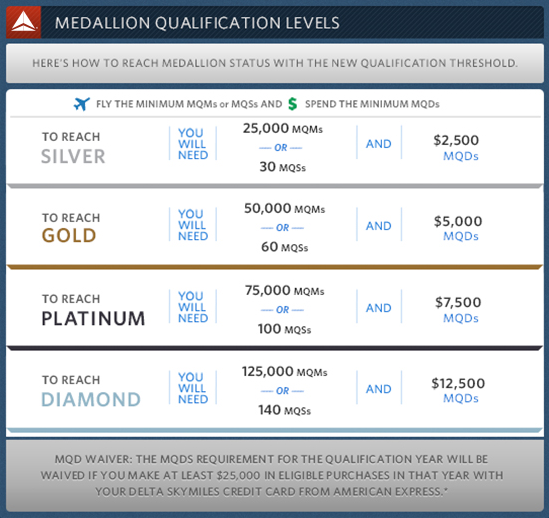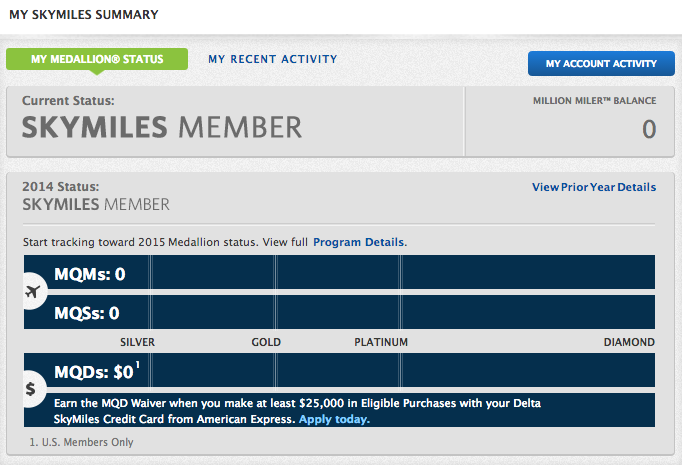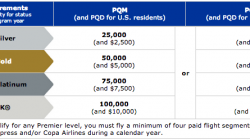Much as I did with yesterday’s post on United’s Premier Qualifying Dollars, today I’ll discuss Delta Air Lines’ Medallion Qualifying Dollars (MQDs) and what you need to know about earning elite status in 2014. Amol wrote about MQDs at the time of the program change and my personal opinion is that they have been far more upfront about the changes than United has with their own revenue-based elite requirements. Furthermore, Delta has provided a more generous policy for receiving an exemption that is worth learning more about.
What’s Changing for SkyMiles Elite Status
None of the other qualification requirements are changing. You still need to earn the same number of Medallion Qualifying Miles (MQMs) or Medallion Qualifying Segments (MQSs) for each particular elite tier. There is no requirement you actually fly on Delta to earn this elite status. But in addition to the number of MQMs or MQSs you earn, you also have to spend a certain amount of money, which are tracked as MQDs.
Because Delta has three elite tiers at 25K, 50K, and 75K miles it makes sense that you would need $2,500, $5,000, and $7,500 in MQDs to requalify for elite status. But there is no 100K-mile tier. Instead, Diamond status jumps to 125,000 MQMs and $12,500 MQDs. You really need to be paying attention if Diamond status is your goal.
How to Earn Medallion Qualifying Dollars
Like with United, MQDs are not quite as simple as tracking MQMs. And if anything Delta has managed to make it even more complicated. (Not surprising for an airline that seems to hate its alliance partners.) If you book all your tickets through Delta.com or with a Delta agent you are probably okay. But if you make a habit of booking travel through other booking channels, you might run into an issue.
All flights operated by Delta Air Lines with a “DL” flight number will earn MQDs, regardless of which airline actually issues the ticket. You’re pretty safe if it says “DELTA” in big letters on the side as you board.
For other airlines that Delta partners with, whether they are SkyTeam partners or other SkyMiles partners, you will only earn MQDs if the ticket is issued by Delta. The ticket number should start with 006…
Furthermore, credit must be from partner airlines part of Groups 1, 2, or 3. Delta divides its airline partners into four groups that reflect how many miles you’ll earn with each. Group 4 airlines do not earn any credit toward elite status (no MQMs, MQSs, or MQDs). These include Hawaiian, Korean Air, Malaysia, and Olympic.
Note that on this last point it is not so simple as dividing between SkyTeam and non-SkyTeam carriers. Korean Air is a SkyTeam alliance member but earns no credit. Alaska Airlines is not a SkyTeam alliance member and earns full credit.
All this is different from earning MQMs in the past, where it was as simple as changing the frequent flyer number on the ticket. Now you have to make a decision in advance when you purchase the ticket in order to earn MQDs (although you can still change the FF# to a different program at a later time and can earn MQMs even if you book through someone else).
Calculating Medallion Qualifying Dollars
It’s pretty easy to calculate MQMs. A tool like GCMap.com can tell you how far you’ll fly. Delta has a simple table for applying fare class multipliers. Figuring out partner elite credit is challenging, yes, but it’s just another multiplier.
Like MQMs, the MQDs will be earned by the passenger who travels — regardless of who purchased the ticket — and are awarded only after travel is complete. But determining the number of MQDs each ticket earns requires breaking down the fare construction. You can do this by performing your preliminary search on ITA Matrix or looking at the passenger receipt.
MQDs are earned only for the base fare and carrier-imposed surcharges, including fuel surcharges. Economy Comfort and other preferred seating upcharges are also eligible. But government-imposed taxes and fees are not eligible. On domestic itineraries this is but a few dollars and not worth worrying about, but do pay attention during international travel when they can add up to $100 or more.
Waiving the MQD Requirement
There are only two ways to receive an exemption from the MQD requirement. Note that unlike with United, these apply to every elite tier. Even Diamond Medallion members can avoid spending the $12,500 required to qualify.
- Live outside the United States.
- Spend $25,000 or more in net purchases on any Delta co-branded credit card issued by American Express.
You can check your online account summary to see whether you’ve completed the $25,000 spend requirement to receive a MQD waiver.
Summary
This post is only meant to explain the Medallion Qualifying Dollar requirements. Delta offers many other rules that explain Medallion Qualifying Miles and Segments on their website. But if you haven’t been tripped up before I wouldn’t worry about them as much.
I also want to remind you that if you miss any one requirement, you will only earn the elite status entitled by the requirements you do meet. For example, if you earn $12,500 MQDs but earn only 25,000 MQMs, you will only get Silver Medallion status. And if you earn 125,000 MQMs but only $7,500 MQDs, you will only get Platinum Medallion status. Of course, in the latter case you would have a lot of extra roll-over MQMs to help you next year.
On a positive note, now that the MQDs have been implemented, you can look forward to an update to my elite status comparison tables coming next week.





